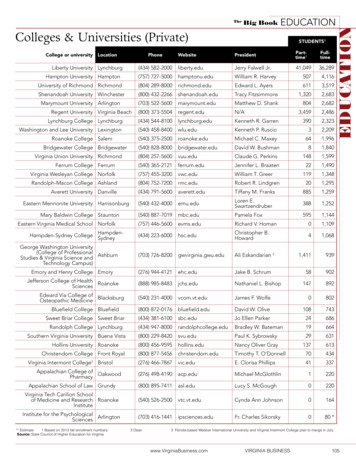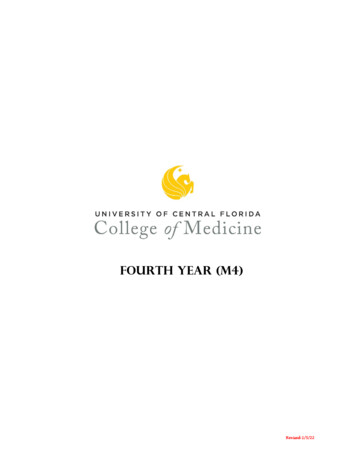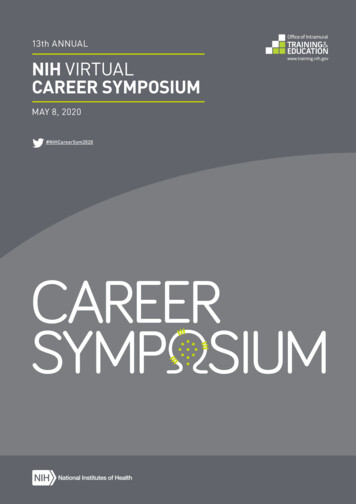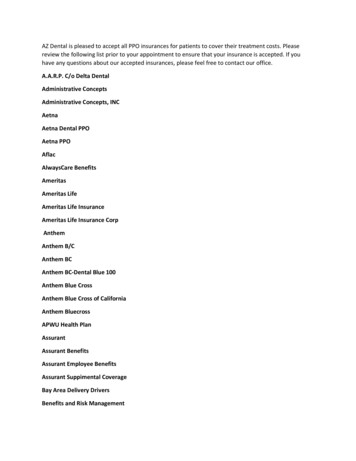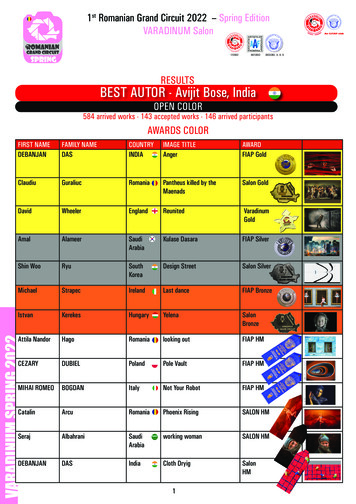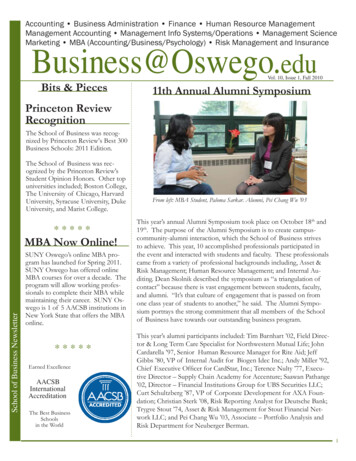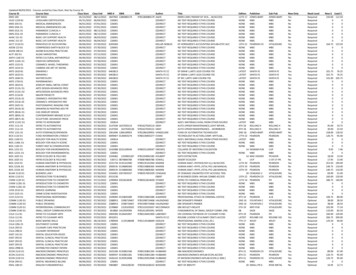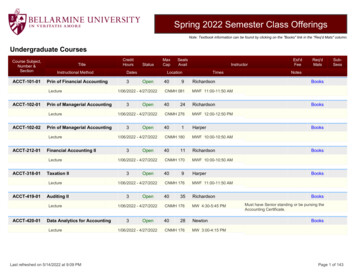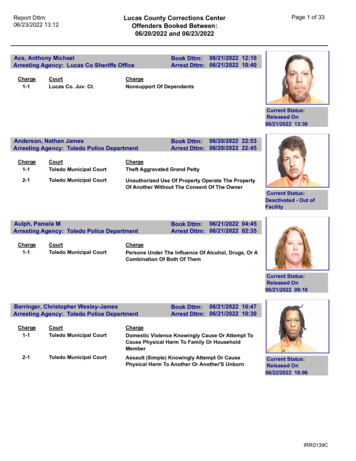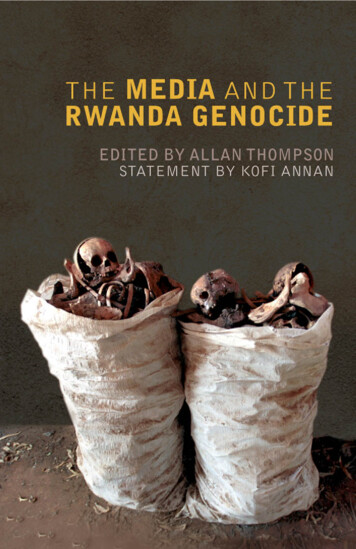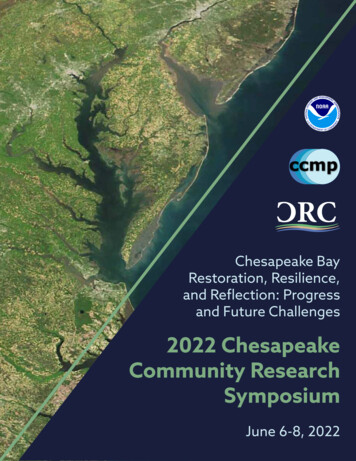
Transcription
Chesapeake BayRestoration, Resilience,and Reflection: Progressand Future Challenges2022 ChesapeakeCommunity ResearchSymposiumJune 6-8, 2022
Table of ContentsWelcome. . . . . . . . . . . . . . . . . . . . 1Plenary Speakers. . . . . . . . . . . . . 2Panel Members. . . . . . . . . . . . . . . 4Schedule. . . . . . . . . . . . . . . . . . . . 12
Welcome to the Chesapeake CommunityResearch Symposium 2022ScopeThe theme of the 2022 symposium is Chesapeake Bay Restoration, Resilience, and Reflection: Progress and FutureChallenges. The Scope and Aims of the symposium are as follows:Significant progress has been made toward restoring Chesapeake Bay water quality and living resources. This progressincludes the achievement of the 2025 goals for nitrogen and phosphorus pollutant load reductions collectively fromhundreds of Chesapeake Bay watershed municipal and industrial wastewater treatment facilities a decade early. In addition,trends in recent years suggest that the summertime anoxic volume (i.e., dead zone) is decreasing and submerged aquaticvegetation has shown signs of recovering. However, restoration efforts face significant challenges as we enter the thirddecade of the 21st century. Perhaps the most daunting future challenge is maintaining progress in the face of a changingnatural and human environment. Globally influenced changes in regional weather patterns and sea level rise are affectingtemperature, watershed dynamics, groundwater processes, estuarine hydrodynamics, biogeochemistry, and ecology. Inaddition, increasing human population in the watershed continue to influence stressors that will interact with the effects ofclimate change and sea level rise. Moreover, there is a pressing need to consider the effects that changing environmentalconditions have on higher trophic levels and ecosystem services which, until recently have received considerably lessattention than submerged aquatic vegetation and benthic filter feeders.By bringing together managers, scientists, and stakeholders for a series of plenary talks, panel discussions, and specialsessions, the 2022 Chesapeake Community Research Symposium will not only highlight the progress that has been madetoward restoring the Chesapeake Bay and enhancing coastal community resilience, but will also address future challengesto maintaining this progress in the face of our changing human and natural environment.Planning CommitteeKim De Mutsert - University of Southern MississippiBill Ball - Chesapeake Research ConsortiumRandy Rowel - Chesapeake Research ConsortiumMarjy Friedrichs - Virginia Institute of Marine Science RaleighGary Shenk - USGS - Chesapeake Bay Program OfficeHood- University of Maryland Center for Environmental ScienceCecily Steppe - United States Naval AcademyKattie Iwanski - Green Fin StudioDenice Wardrop - Chesapeake Research ConsortiumDave Jasinski - Green Fin StudioY. Joseph Zhang - Virginia Institute of Marine ScienceJeni Keisman - U.S. Geological Surve1
Plenary Speakers30 Year of Reporting on the Chesapeake BayKarl BlankenshipKarl Blankenship has been writing about theChesapeake Bay since 1990. He is the founding editorof the Bay Journal and served as its editor for 30years. He has won numerous awards for his work,including the 2001 Excellence in Journalism Awardfrom the Renewable Natural Resources Foundationand a Lifetime Achievement Award from theChesapeake Bay Foundation. He is currently Editorat-Large with the Bay Journal, focusing on producingin-depth reports on issues. Before the Bay Journal,he was a reporter at the Harrisburg (PA) PatriotNews, and the Saginaw (MI) News. He is a graduate ofMichigan State University with a degree in journalism.2
One Scientist’s View of the Future of Chesapeake Bay RestorationDr. Jeremy TestaJeremy Testa is an Associate Professor at the UMCES Chesapeake BiologicalLaboratory in Solomons, Maryland. Jeremy is a coastal systems ecologistwhose research has an emphasis on the processes of eutrophication, nutrientcycling, and coastal hypoxia and acidification. Jeremy has been working in theBay region for 15 years, applying a combination of experimental approaches,historical data analysis, and coupled biogeochemical-hydrodynamic modelingstudies to address numerous water-quality-related topics. Jeremy has appliedhis research in numerous ways, including participation in the seasonal Bayhypoxia forecasts, the Maryland Ocean Acidification Action Plan, and supportingcounty- and state-level water-quality management with targeted research andmonitoring.Chesapeake Progress and Challenges: Bridging Science and PoliticsDelegate Sara LoveSara Love was elected to the Maryland House of Delegates in November 2018.She serves on the Environment & Transportation Committee, and two of itssubcommittees, Transportation & Motor Vehicles and Land Use & Ethics. For thelast two years she has chaired the Montgomery County House Delegation LandUse, Transportation and Public Safety Committee. In 2019 Sara was appointed tothe Chesapeake Bay Commission and in 2022 became the Vice Chair of theMaryland Delegation.Prior to her election to the Maryland House, Sara was the Public Policy Directorfor the ACLU of Maryland, where she led their policy and legislative work. Duringthat time, she worked on many issues including reproductive rights, racialjustice, public funding for public schools, policing reform, criminal justicereform, saner drug policies, technology and privacy, the First Amendment, opengovernment, and voting rights. Before working for the ACLU, Sara served as theGeneral Counsel and Legal Director of NARAL Pro-Choice America where sheworked on federal reproductive rights policy and led a staff to support affiliatesacross the country working on state policy. She also spent several years out ofthe workforce, raising her two children. Sara graduated from PrincetonUniversity and Northwestern University School of Law. 3
PanelIdentifying Critical Uncertainties: ComprehensiveEvaluation of System Response (CESR) ReportModeratorDenice WardropDenice Heller Wardrop was one of the first Systems Engineers to graduate from the University ofVirginia, which she followed with an MS in Environmental Sciences from the same institution. Shepracticed as a consulting environmental engineer for over a decade before moving to State CollegePA, embracing football as well as basketball, and finishing a PhD in Ecology at Penn State. In addition toher role as Executive Director of the Chesapeake Research Consortium, she is a Research Professor ofGeography at Penn State University. Her discovery areas are the functioning of wetlands of all kindsand general issues in landscape ecology, and she works a great deal on how human activities impactthe ability of natural systems to provide ecosystem services. She serves on science committees thatadvise both the Chesapeake Bay and Everglades restoration efforts, and passionately supportshumans and aquatic systems finding ways to bring out the best in each other.PanelistsBill DennisonDr. Bill Dennison is a Professor of Marine Science and Vice President for Science Applications at the University ofMaryland Center for Environmental Science (UMCES). Dr. Dennison’s primary mission within UMCES is tocoordinate the Integration and Application Network. The University of Maryland Center for EnvironmentalScience is one of two research and service institutions in the 12-institution University System of Maryland.UMCES is comprised of three laboratories distributed across the watershed of Chesapeake Bay within Maryland:Appalachian Laboratory in Frostburg, Chesapeake Biological Laboratory on the western shore of ChesapeakeBay in Solomons and Horn Point Laboratory on the eastern shore of Chesapeake Bay near Cambridge as well asMaryland Sea Grant College in College Park, Maryland. UMCESalso operates an Annapolis Liaison Office. Bill Dennison rejoined UMCES in 2002 following a ten year stint at theUniversity of Queensland in Brisbane, Australia. He originally started at UMCES (then the Center forEnvironmental and Estuarine Science) in 1987 as a Postdoctorate/Research Assistant Professor based at HornPoint Laboratory. In Australia, Bill developed an active Marine Botany group at the University of Queensland withstrong links to the Healthy Waterways Campaign for Moreton Bay. Bill obtained his academic training fromWestern Michigan University (B.A., Biology & Environmental Science), the University of Alaska (M.S., BiologicalOceanography), The University of Chicago (Ph.D., Biology), and State University of New York at Stony Brook(Postdoc, Coastal Marine Scholar).4
Identifying Critical Uncertainties: Comprehensive Evaluation ofSystem Response (CESR) ReportZach EastonDr. Easton is a professor in the department of Biological SystemsEngineering at Virginia Tech. His research groups core programs focus onsynergies between soil & water resources, environmental change,biophysics, and sustainable agricultural systems. They do this using highlevel computational approaches, remote and in situ sensing, physicalstudies, and systems level analysis. The research group is interdisciplinarywith backgrounds in hydrology, biology, atmospheric science, computerscience, and engineering and their collaborators work in fields from animalscience to agricultural economics to robotics and autonomous vehicles.Kenneth RoseKenneth Rose is the France-Merrick Professor in Sustainable EcosystemRestoration at Horn Point Laboratory (University of Maryland Center forEnvironmental Science). He received his MS and PhD in Fisheries from theUniversity of Washington, and was a research staff member at Oak RidgeNational Lab and Professor and Associate Dean at Louisiana State Universitybefore coming to UMCES. Dr. Rose’s research uses mathematical andsimulation modeling to predict population and food web responses toenvironmental factors, habitat, harvesting, and multiple stressors (includingdeoxygenation, climate change, and ocean acidification). He has worked inlakes, rivers, estuaries, coastal shelf, and open ocean systems. Dr. Rose hasserved on many advisory and science review committees, including for theNational Academy of Sciences and Army Corps of Engineers, biologicalopinions, environmental impact statements, and planning and assessingcoastal restoration. Dr. Rose has published over 200 scientific papers,served as editor for multiple journals, is a fellow of the American Associationfor the Advancement of Science, and received the lifetime achievementaward from the American Fisheries Society. Dr. Rose is presently an at-largemember of the Chesapeake Bay Scientific and Technical AdvisoryCommittee.5
Identifying Critical Uncertainties: Comprehensive Evaluation ofSystem Response (CESR) ReportKurt StephensonKurt Stephenson is a professor in the Department of Agriculturaland Applied Economics at Virginia Tech where he teachesenvironmental and natural resources economics. His researchinterests include market-based environmental policy and waterresource economics and policy. Kurt currently serves on a numberof governmental advisory committees and recently concluded 8years of service on the Chesapeake Bay Program’s Scientific andTechnical Advisory Committee.Jeremy TestaJeremy Testa is an Associate Professor at the UMCES ChesapeakeBiological Laboratory in Solomons, Maryland. Jeremy is a coastalsystems ecologist whose research has an emphasis on theprocesses of eutrophication, nutrient cycling, and coastal hypoxiaand acidification. Jeremy has been working in the Bay region for 15years, applying a combination of experimental approaches,historical data analysis, and coupled biogeochemical-hydrodynamicmodeling studies to address numerous water-quality-related topics.Jeremy has applied his research in numerous ways, includingparticipation in the seasonal Bay hypoxia forecasts, the MarylandOcean Acidification Action Plan, and supporting county- and statelevel water-quality management with targeted research andmonitoring.6
PanelThe State of Diversity in Chesapeake Bay Restoration Efforts: APanel Discussion on the Need for More Diversity in theEnvironmental Movement and How to Facilitate Positive OutcomesModeratorRandy K. Rowel Jr.Randy Rowel, CRC’s C-StREAM Program Coordinator, earned degrees insocial science, environmental sciences, and global sustainability, and hasover 10 years of experience in teaching, and higher education acrossareas of instruction (undergraduate advisement and global travelcourses and graduate resident in India) and research, over 10 years inDEIJ (including state-level organizations) and over 15 years in upperadministration. He specializes in facilitating discussions, strategicplanning, and professional developments around DEIJ in environmentaland executive natural resource management.He served as Maryland Department of Natural Resources first everDiversity and Inclusion Director, responsible for developing strategy,creating infrastructure, and programming, and introducing assessmentmethods like the Bilingual Assessment Tool, a program to provideworkers with compensation for using multilingual skills on the job. Mr.Rowel has a record of coordinating funding activities for environmentalprojects as well as publishing in capacity building for solving ourenvironmental challenges in communities of color. He also is owner of agrant and proposal writing firm, RR & Associates, where environmentand community meet. He also is the Chair of the EnvironmentalCommission for the City of Annapolis, the first African American personto ever hold that position.7
The State of Diversity in Chesapeake Bay Restoration Efforts: A Panel Discussion on theNeed for More Diversity in the Environmental Movement and How to Facilitate PositiveOutcomesPanelistsRichard W. AllenRichard W. Allen is the Director of Equal Opportunity and Americans withDisabilities Act Coordinator at the Maryland Department of Natural Resources (MDDNR). Allen has worked in this capacity for the past 19.5 years as the Director ofthe MD DNR Office of Fair Practices, administering the Equal Opportunity, ADA,Workforce and Cultural Diversity, Workplace Mediation Services, EO and Title VI-CivilRights Training and Staff development of employees, and supervision of a MultiCultural Coordinator and a Diversity and Inclusion Coordinator within the office.Prior to MD DNR Allen worked as the Chief of Equal Employment Opportunity andAffirmative Action at the Maryland Aviation Administration-BWI Marshall Airportand an Equal Employment Opportunity Officer at the Maryland TransitAdministration (MTA ) of MDOT. Richard has 24.5 years of work experience withinMaryland state government units.Prior to the Maryland State government, Allen served as the Executive Director ofSuburban Maryland Fair Housing Inc., for 5 years in Montgomery County, MD, and asthe Fair Housing Specialist of the Lancaster City-County Human RelationsCommission in Pennsylvania for 3 years. Richard has approximately 33 years of fairhousing, equal employment opportunity, the ADA and ReasonableAccommodations, and Title VI-Environmental Justice/LEP work experience.Allen is a 1975 graduate of Howard University in Washington, D.C. with a Bachelor’sdegree in Political Science.Finally, Richard is a past First Vice-President of the Maryland State Chapter of theSouthern Christian Leadership Conference (SCLC); a current member of theExecutive Board at Large of the Montgomery County, MD NAACP Branch #7022;serving on the Housing and Labor and Industry Committees, more recently wasappointed by County Executive Mark Erlich as a Member of the Montgomery CountyCommittee Against Ethnic Hate; and serves on the Board of Directors at Large ofthe United Black Fund, Inc. of Washington, D.C. Region.8
The State of Diversity in Chesapeake Bay Restoration Efforts: A PanelDiscussion on the Need for More Diversity in the Environmental Movementand How to Facilitate Positive OutcomesKelly ClarkDr. Clark is a Science Administrator, with experience in both programmanagement and science policy. He is the founding Director of the MorganState University’s Patuxent Environmental and Aquatic ResearchLaboratory (PEARL).He is the first African-American to hold the position of Director at an oceansciences laboratory. As director, Dr. Clark worked with regional and nationaldecision makers and resource managers to take sound actions on issuesrelated to Maryland’s coastal and estuarine natural resources. Hisexpertise and insights are often sought after at the State and Federal level.At the National level he has been appointed to the Ocean Research AdvisoryPanel, to provide independentadvice and guidance to the Cabinet-level National Ocean Council. He hasserved on the policy committee and Chaired the Education Committees ofthe National Association of Marine Laboratories.At the state level His present appointments included the Patuxent River Commission, where he is pastChair; and the Maryland Oyster Advisory Commission, which provides direction to the MarylandDepartment of Natural Resources. Through membership in such regional organizations as the MarylandSea Grant Institutional Council and the Jug Bay Science Advisory Committee, Dr. Clark worked to ensurethat science and scientists remain a relevant, present and useful part of our social framework. Dr. Clarkis a strong and persistent advocate for in increasing diversity in the marine sciences.At past positions as Program Manager for the Smithsonian Louis Stokes Alliance for MinorityParticipation, member of Human Relations Committee of the American Institute at Biological Sciencesand Chair of the National Association of Marine Laboratories Education Committee he continually worksto identify ways to increase participation by underrepresented groups.Dr. Clark received his PhD inMarine Ecology in 2001 from the University of Maryland Marine Estuarine and Environmental SciencesProgram. His research interests continue to be focused on predator-prey interactions and anthropogeniceffects in the nearshore zone of estuaries. He is second of nine children and has been the other half ofAmerica’s Couple for 29 years and counting.9
The State of Diversity in Chesapeake Bay Restoration Efforts: A PanelDiscussion on the Need for More Diversity in the EnvironmentalMovement and How to Facilitate Positive OutcomesKimberley Mitchell-JamesKimberley Mitchell-James is an Air Force veteran and specialist in operational resilience,efficiency, sustainability, and environmental and social governance (ESG) with 10 years’experience internationally. Effective and strategic leadership in logistical planning andexecution in the defense, travel, hospitality and apparel industries via multi-dimensionalteams towards social, environmental and financial deliverables. Master’s in environmentalscience from Johns Hopkins University.Dr. Randolph RowelDr. Randy Rowel is an Associate Professor in Morgan State University’s (MSU) School ofCommunity Health and Policy and Chair of the Behavioral Health Sciences Department. Randybrings to the Board 40 years of public health practice, much of which took place in AnneArundel County. Other areas of expertise include partnership development and evaluation,Community-Based Participatory Research, practice instructor for graduate level internships,qualitative research and diversity and inclusion-related training. Randy currently serves on theAnne Arundel Medical Center board of trustees and Co-Chair of the Health Equity and AntiRacism Taskforce (HEART). Anne Arundel County, where Dr. Rowel was born and raised, servedas his training ground for public health. Here Dr. Rowel was a community organizer andfounder of two non-profit organizations that addressed substance abuse prevention in publichousing communities. Dr. Rowel delivered numerous cultural diversity training events tofederal, state, and local agencies, one of which included training the entire Annapolis PoliceDepartment. He received his undergraduate degree at Morgan State University and hismasters and doctoral degrees from the University of Utah and the University of MarylandCollege Park, respectively.At Morgan State University, Dr. Rowel is also the Director of the Why Culture Matters DisasterStudies Project, an effort that engages students and faculty to inform public healthprofessionals and faith- and community-based organizations about the needs of vulnerablepopulations during natural and technological disasters. In this capacity he utilized the arts as acommunity engagement strategy for numerous initiatives and served as an investigator forthe Department of Homeland Security (DHS) funded National Center for the Study ofPreparedness and Catastrophic Event Response (PACER) at Johns Hopkins University. Dr.Rowel and his research team conducted studies that examined the relationship between dailycrisis (community stressors) and preparedness behaviors and developed curriculum entitledthe Role of Pastors in Disasters: Training Pastors to be Agents of Safety. During this period, heserved on National Academy of Science committees to advance disaster research.10
The State of Diversity in Chesapeake Bay Restoration efforts: A panelDiscussion on the Need for More Diversity in the Environmental Movementand How to Facilitate Positive OutcomesWhile at Morgan, Dr. Rowel became increasingly involved with health care systems by engaging students and faculty inservice-learning projects to improve health outcomes among low-income populations. He also served on MedStar Health’sCommunity Needs Assessment Taskforce and more recently Anne Arundel Health Systems’ Health Equity Taskforce. Dr.Rowel resides in Annapolis with his wife DeShirle and is a proud father of 4 children and 8 grandchildren.Darius A. Stanton IIDarius A. Stanton II is professor, entrepreneur and chemical review manager at the USEnvironmental Protection Agency. Studying environmental science and political science inundergrad, Darius completed his Bachelors of Science at Claflin University in Orangeburg, SouthCarolina. Following Claflin University, Darius obtained a Masters in Environmental Managementfrom Duke University’s Nicholas School of the Environment where he focused on global climatechange and community-based environmental management. After graduate school Dariusstarted his career at the Chesapeake Research Consortium (CRC), working as anenvironmental management staffer at the EPA’s Chesapeake Bay Program office. At the CRC,Darius lead the environmental justice and diversity workgroup initiatives. Before leaving theCRC, Darius spearheaded the creation of the Chesapeake Student Recruitment, EarlyAdvisement, and Mentoring (C-StREAM) internship program. Darius currently works at EPAheadquarters under the Office of Chemical Safety and Pollution Prevention and Prince George’sCommunity College as an Adjunct Professor.Carmera ThomasCarmera Thomas is the Director of Urban Conservation Initiatives at The Conservation Fund.She manages the Parks with Purpose program focusing on equitable park development andgreen infrastructure through a community-centered approach. Carmera works with residents,community-based groups and partner organizations to restore urban green spaces to reducestormwater impacts and ensure safe, resilient and healthy communities. Before joining TheConservation Fund, Carmera was the Baltimore Program Manager at the Chesapeake BayFoundation. Carmera earned her B.S. in Biology from North Carolina Wesleyan College. Sheserves as the Vice Chair of theBoard for Anne Arundel County Watershed Stewards Academy, a board member of WaterfrontPartnership of Baltimore, Inc., and is a member of the Anne Arundel CountyCitizen Environmental Commission.11
ScheduleThe Chesapeake Community ResearchSymposium 2022 will take place on fromJune 6-8, 2022 .12
June 6th Schedule13
June 6th Schedule Con't14
June 7th Schedule15
June 7th Schedule Con't16
June 8th Schedule17
June 8th Schedule Con't18
Western Michigan University (B.A., Biology & Environmental Science), the University of Alaska (M.S., Biological Oceanography), The University of Chicago (Ph.D., Biology), and State University of New York at Stony Brook (Postdoc, Coastal Marine Scholar). Identifying Critical Uncertainties: Comprehensive Evaluation of System Response (CESR) Report 4
